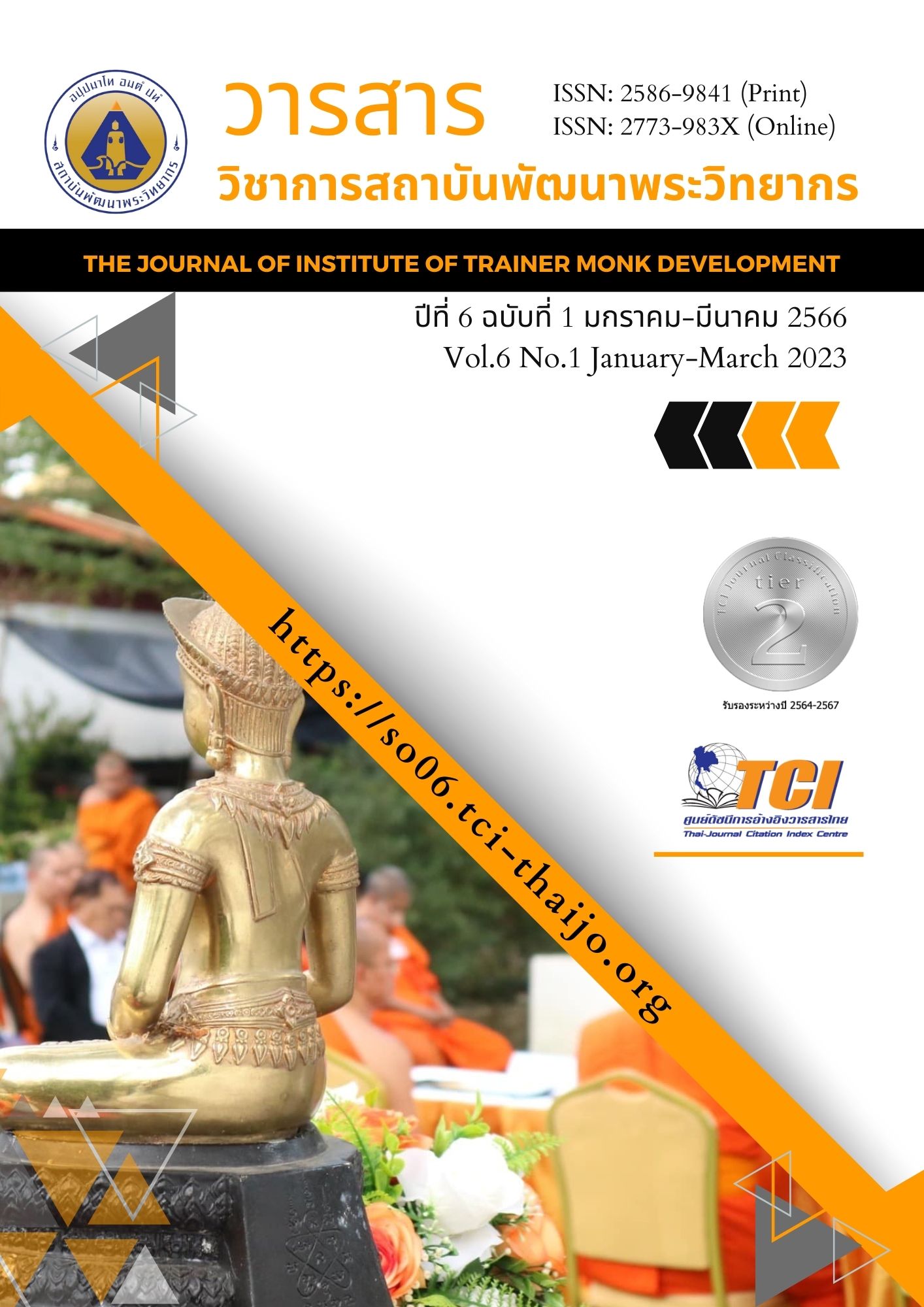การสร้างพลวัตกลุ่มในองค์กรธุรกิจตามหลักการแห่งอปริหานิยธรรม 7
Main Article Content
บทคัดย่อ
บทความนี้มีวัตถุประสงค์ เพื่อวิเคราะห์การประยุกต์ใช้หลักการแห่งอปริหานิยธรรม 7 กับการสร้างพลวัตกลุ่มในองค์กรธุรกิจ ปัจจุบันองค์กรประสบปัญหาเรื่อง ความสามัคคีในการทำงานเป็นทีม ดังนั้น การสร้างพลวัตกลุ่มจึงเป็นแนวทางช่วยพัฒนาความสัมพันธ์เชิงสังคมและจิตวิทยาเชิงการรับรู้ ทัศนคติ และความคิดเห็นภายในและระหว่างกลุ่มคน สอดคล้องกับหลักคำสอนของพระพุทธเจ้า คือ อปริหานิยธรรม ว่าด้วยหลักธรรมแห่งความสามัคคีสำหรับการทำงานเป็นทีมที่มีประสิทธิภาพ อันเป็นที่ตั้งแห่งความไม่เสื่อม และสนับสนุนให้เกิดความเจริญรุ่งเรืองภายในองค์กรประกอบด้วย 7 ประการ ดังนี้ (1) ประชุมกันอย่างสม่ำเสมอ (2) ร่วมมือทำกิจอย่างพร้อมเพรียง (3) เป้าหมายร่วมและปฏิบัติตามระเบียบข้อบังคับ (4) เคารพให้เกียรติ และรับฟังผู้อาวุโสภายในองค์กร (5) ไม่กดขี่และข่มเหงผู้ด้อยกว่า (6) เคารพบูชาสถานที่และทรัพย์สินขององค์กร (7) สนับสนุนผู้ที่ประพฤติและปฏิบัติดี สรุปได้ว่าการนำหลักธรรมทั้ง 7 ประการมาประยุกต์ใช้สร้างพลวัตกลุ่มสำหรับองค์กรธุรกิจ ทำให้บุคลากรลดความขัดแย้งและสร้างความสามัคคี เพื่อที่จะทำให้องค์กรธุรกิจบรรลุผลสำเร็จในเป้าหมายในการดำเนินธุรกิจและสร้างองค์กรอย่างยั่งยืน
Article Details

อนุญาตภายใต้เงื่อนไข Creative Commons Attribution-NonCommercial-NoDerivatives 4.0 International License.
บทความที่ได้รับการตีพิมพ์เป็นลิขสิทธิ์ของวารสารวิชาการสถาบันพัฒนาพระวิทยากร
ข้อความที่ปรากฎอยู่ในบทความที่ได้รับการตีพิมพ์ในวารสาร ถือเป็นความรับผิดชอบของผู้เขียนบทความ และข้อคิดเห็นนั้นไม่ถือว่าเป็นทัศนะและความรับผิดชอบของกองบรรณาธิการวารสารวิชาการสถาบันพัฒนาพระวิทยากร
เอกสารอ้างอิง
กนกพันธรน์ โลกุตรวงศ์. (2556). การจัดการช่องว่างระหว่างวัยเพื่อการพัฒนาทรัพยากรมนุษย์ในองค์การ. วารสารปัญญาภิวัฒน์. 3(2), 136-137.
คำยวง วราสิทธิชัย. (2544). สามัคคีคำฉันท์: วรรณกรรมชิ้นเอกของชิต บุรทัต. วารสารวรรณวิทัศน์. 1(1), 8-9.
ฐิติพร สะสม. (2563). การปรับใช้หลักธรรมทางพุทธศาสนาเพื่อการบริหารงานในสังคมปัจจุบัน. วารสารปัญญาปณิธาน. 5(1), 17.
ทวีศักดิ์ ทองทิพย์. (2561). พุทธปรัชญาบริหารการศึกษา. กรุงเทพมหานคร: โรงพิมพ์มหาจุฬาลงกรณราชวิทยาลัย.
ทองดี ศรีตระการ. (2559). การพัฒนารูปแบบการบริหารงานวิชาการตามหลักอปริหานิยธรรม. วารสารปัญญาปณิธาน. 1(1), 2.
ธรรณปพร หงส์ทอง. (2564). การบริหารองค์กรพระสงฆ์ไทยตามแนวพุทธกาล. วารสาร มจร พุทธศาสตร์ปริทรรศน์. 5(1), 33-34.
พระครูสุพลวุฒิกร (ทวนชัย สุภโร). (2558). ระบอบสามัคคีธรรม: บทเรียนจากเจ้าลิจฉวีถึงสังคมไทย. วารสารครุศาสตร์ปริทรรศน์ฯ. 2(1), 46.
พระพรหมบัณฑิต (ประยูร ธมฺมจิตฺโต). (2562). ศาสนากับเป้าหมาย การพัฒนาที่ยั่งยืน (SDGs). กรุงเทพมหานคร: บริษัทอมรินทร์พริ้นติ้งแอนด์พับลิชชิ่ง จำกัด มหาชน.
พระมหายุทธพิชัย สิริชโย และธิติวุฒิ หมั่นมี. (2561). การบริหารงานตามหลักอปหานิยธรรม. วารสารสมาคมศิษย์เก่ามหาวิทยาลัยมหาจุฬาลงกรณราชวิทยาลัย. 7(2), 140.
พงษ์เทพ จันทสุวรรณ. (2558). THE FUNCTIONS OF THE EXECUTIVE Chester I. Barnard, 1938. วารสารสมาคมนักวิจัย. 20(2), 173.
มานพ นักการเรียน และบานชื่น นักการเรียน. (2562). สถาบันศาสนาตามแนวทางพระพุทธศาสนา. วารสารสิรินธรปริทรรศน์. 20(1), 2-3.
มหาจุฬาลงกรณราชวิทยาลัย. (2539). พระไตรปิฎกภาษาไทย ฉบับมหาจุฬาลงกรณราชวิทยาลัย.กรุงเทพมหานคร: โรงพิมพ์มหาจุฬาลงกรณราชวิทยาลัย.
เสกสรร สายสีสด และคณะ. (2564). การศึกษาพฤติกรรมการดำรงชีวิต (Lifestyles) และความพึงพอใจในการดำรงชีวิตของกลุ่ม LGBTQ+ ในจังหวัดอุดรธานี. วารสารวิทยาการจัดการ. 3(1), 3-4.


